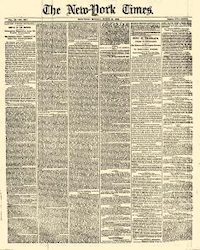The New York Times, June 15, 1860
The Massachusetts Legislature has resorted to the rather unusual proceeding of indorsing Senator SUMNER’S recent Anti-Slavery speech. Whether that body is in the habit of sitting in judgment upon each speech of its Federal Senators, or whether circumstances existed which rendered its indorsement in this specific case particularly desirable, we are unable to say. We do not remember any other instance, however, in which this course has been pursued. We infer, therefore, that the action of the Legislature in this case was prompted by motives which have no application to the ordinary speeches of the Representatives of the State in Federal Congress. The speech itself was exceptional, and that fact may have led the Legislature to think that exceptional action on their part was demanded. It was not an effort calculated to promote any of the practical national objects for which Mr. SUMNER was sent to Washington. It had no direct bearing upon any question awaiting the Senate’s action, nor did it enlighten that body upon any subject over which it had control. It was an elaborate essay upon the character of Slavery; and if it had been delivered as a lecture, or an oration, before a popular audience, it would only been open to such criticism as its intrinsic character might invite. It would not have been out of place, at all events, as it clearly was when delivered in the Senate.
We have very little doubt that public sentiment in Massachusetts concurs fully in Mr. SUMNER’s opinion of the barbarism of Slavery. Indeed, throughout the Northern States, and we suspect with reflecting men at the South, the belief is very general that the institution of Slavery exerts an influence upon the society where it exists in the highest degree unfavorable to the general progress of the community in the arts and accomplishments which mark a high state of Christian civilization. Some of the ablest writers of the South have expressed this opinion in the strongest language; and experience shows it to he founded in truth.
But this is not all that is necessary to justify such a speech as Mr. SUMNER’s in the Senate of the United States. Place, time and circumstances have quite as much to do in determining the duty of men in high places, as the right or wrong of the views they hold. If no good practical result can fairly be expected to follow it, the delivery of such a speech as Mr. SUMNER’s is not worth while; and when, moreover, it is certain to exasperate the public mind, to arouse the hatreds and resentments of individuals and communities, and still further to inflame a sectional agitation already rife and feverish enough to be dangerous to the public peace, its delivery becomes a positive offence against the public good. If Mr. SUMNER’s speech had produced the effect which he evidently expected, it would have been one of the most mischievous publications ever made. Fortunately it has commanded less attention than was anticipated, and has encountered silence in some quarters, and positive disapproval in others, usually disposed to judge speeches of this class with the utmost forbearance. Even the Tribune, while it has published the speech in its editions intended mainly for the country, has not deemed it judicious or wise to give it circulation among its City readers; and some of the most decided Republican papers in the country have protested against the injustice of holding the party responsible for its sentiments.
These indications of dissent have probably led the Massachusetts Legislature to give the speech their indorsement, as a timely and perhaps necessary indication of their continued confidence in their own Senator. We presume, however, that this action on their part will not be held to bind the Republican Party to its opinions.
